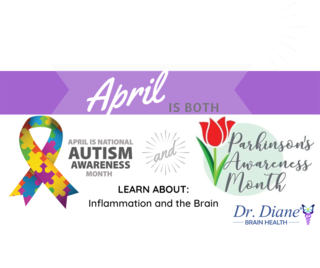Autism
What Do Autism and Parkinson's Have in Common?
One factor to managing symptoms of both ASD and PD is controlling inflammation.
Posted April 25, 2022 Reviewed by Tyler Woods
Key points
- April is Autism and Parkinson's Disease Awareness Month.
- Autism and Parkinson’s Disease (PD) are very different conditions. However, there is a common factor in managing symptoms of both conditions.
- Inflammation in the brain is found in brain disorders including Autism and Parkinson’s Disease.
Autism and Parkinson’s Disease (PD) are very different conditions. However, one common factor is the role diet plays in managing symptoms of both conditions. Why? Inflammation in the brain is found in brain disorders including Autism1 and Parkinson’s Disease2.

What Is Inflammation?
Most people are familiar with inflammation as the redness, swelling, warmth, and/or pain that occurs in response to a wound or injury, like when you get a cut or an insect bite. This acute inflammation is a normal response of the body to prevent tissues from infection, injury, or disease.
This inflammation response typically promotes healing, but if uncontrolled it may become harmful and cause tissue damage. Uncontrolled or prolonged inflammation is called chronic inflammation. Studies show3 that chronic inflammation is a root cause of many serious diseases.
Reducing inflammation in the body and brain is the best strategy for decreasing the risk of disease. In addition, reducing inflammation can help manage symptoms of Autism, Parkinson’s Disease, and other conditions.
About Autism
Autism, or Autism Spectrum Disorder (ASD) is a range of brain development conditions characterized by challenges with social skills, repetitive behaviors, speech, and nonverbal communication. According to the Centers for Disease Control4, 1 in 44 children in the United States are diagnosed with autism. Autism spectrum disorder impacts the nervous system. People with autism have different ways of communicating, learning, and moving.
My experience with autism was teaching and developing the first integrative classroom in the United States for autistic children in Marshfield, Massachusetts (1972-1974.) As part of this integrative program, I introduced the first use of sign language to help autistic children communicate. Also introduced was the importance of nutrition and how it relates to many of the symptoms of Autism.
About Parkinson’s Disease
Parkinson’s Disease (PD) is a neurodegenerative brain disorder that affects dopamine-producing neurons in the brain. Dopamine is a chemical that plays an important role in movement and coordination. When approximately 60 to 80 percent of the dopamine-producing cells are damaged and do not produce enough dopamine, the motor symptoms of Parkinson’s disease appear. These symptoms include shaking, stiffness, and difficulty with balance, coordination, and walking.
Brain Health Diet
Through my personal and professional experience as a neuropsychologist and a brain injury survivor, I have become keenly aware of how inflammation can affect the body and brain. I follow a diet rich in foods that benefit the brain and reduce inflammation, and I encourage my clients/patients to do the same.
When I first meet with a client or patient, I ask them to make a list of their symptoms and rank them by severity. For example, a hand tremor may be a symptom for a person with Parkinson’s Disease or light sensitivity for a person with autism.
Based on their symptoms, I create two food lists. One titled YES and one titled NO. The person can eat all they want from the YES list, but they must avoid all the foods from the NO list for two weeks.
After two weeks, I ask them to review their symptom list and evaluate which symptoms have improved from this elimination diet. In cases with children with autism and sensory issues, it may take longer than two weeks to change their eating habits.
Once that has been done, they will re-introduce one food from the NO list each day and note how that food has affected them. If that food makes the symptom return or worsen, I recommend they eliminate that food permanently.
Brain Health Diet Examples:
- Eat plenty of foods rich in Omega-3 fatty acids.
- Fish and other seafood (especially cold-water fatty fish, such as wild-caught salmon, mackerel, tuna, herring, and sardines).
- Nuts, seeds, and legumes (flaxseed, chia seeds, walnuts, chickpeas, and lentils).
- Plant oils (avocado oil, flaxseed oil, olive oil, and coconut oil).
- Green leafy vegetables (spinach, kale, and collards).
- Acceptable sweets: dark chocolate and raw honey.
- Eliminate refined sugar, corn syrup, processed foods, and alcohol.
- Eliminate any fruit, vegetable, or grain that can be made into alcohol, such as: grapes, apples, pears, peaches, and plums, rice, corn, white potatoes, wheat, barley, oats, and rye.
Eating an anti-inflammatory diet customized to your specific symptoms and needs can change your life.
Nutritional Experts and Inflammation
Diet is such an important factor in brain health. To that end, I have a certified nutritional educator, Martha Lindsay, MS, CNE, as part of Dr. Diane’s Integrative Team of Brain Health Experts.
Martha is also certified in Nutrition Response Testing and is a GAPS Certified Practitioner. GAPS stands for Gut and Psychology Syndrome. GAPS Diet helps support the body’s immune system to heal and repair damage done by inflammation and toxins. This approach can be very effective in improving symptoms of brain disorders, including Autism, Parkinson’s Disease, and ADHD.
Part of my licensure as a psychologist requires continuing education in many areas, including nutrition. I recently took an online course with Sally Fisher, M.D., MS. The topic was “An Anti-Inflammatory Lifestyle.” In this course, she emphasizes the most recent research on inflammation. She presented many studies and research showing how inflammatory foods affect most Autism and Parkinson’s Disease symptoms, including depression and anxiety.
Conclusion
The World Health Organization, American Heart Association, American Cancer Association, Global Council on Brain Health all agree with the following:
Eat a nutritious diet based on a variety of foods that originate mainly from plants rather than animal.” – Global Council on Brain Health.
They also agree that adding the following, also helps ease symptoms of inflammation that can worsen symptoms of Autism and Parkinson’s Disease:
- Mindfulness
- Yoga
- Hypnosis
In addition, I also recommend neurofeedback to aid in inflammation.
References
Meltzer A, Van de Water J. The Role of the Immune System in Autism Spectrum Disorder. Neuropsychopharmacology. 2017;42(1):284–298. doi:10.1038/npp.2016.158 https://www.ncbi.nlm.nih.gov/pmc/articles/PMC5143489/
Troncoso-Escudero, P., Parra, A., Nassif, M. & Vidal, R. L. Outside in: Unraveling the role of neuroinflammation in the progression of Parkinson's disease. Frontiers in Neurology 9, 860 (2018).




